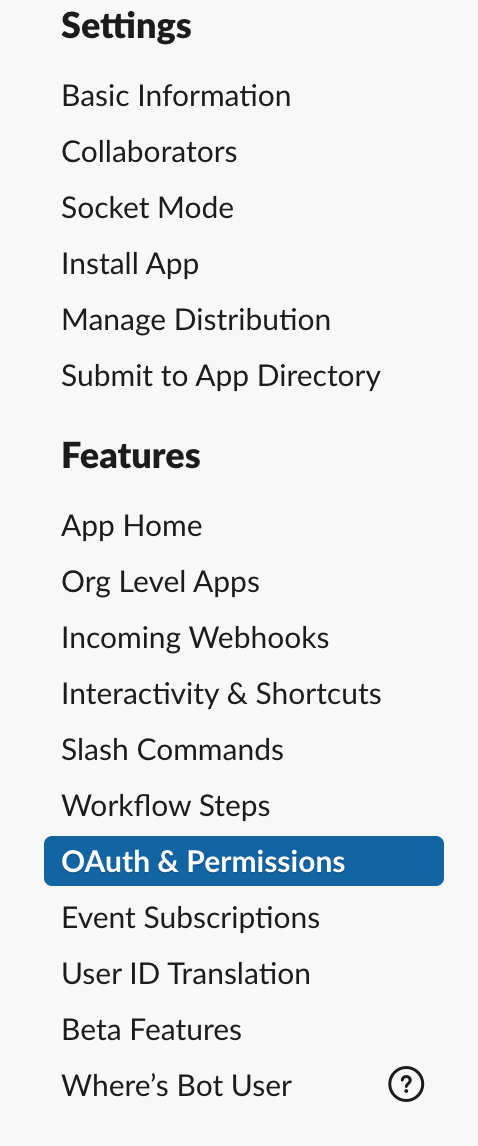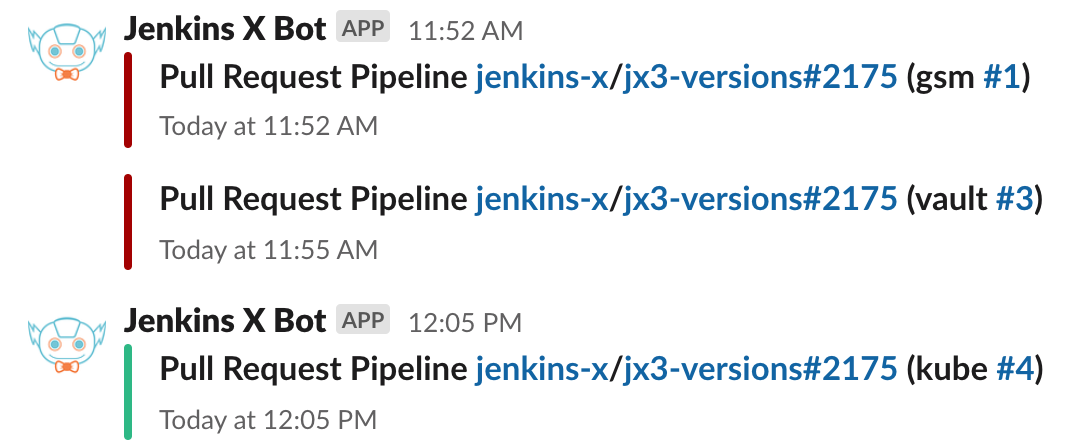Slack
Many of us use chat to keep in touch with the developers and tools we work with. Slack is becoming popular in commercial settings and is already used throughout the Kubernetes open source ecosystem: including the Jenkins X project slack channels
To get slack notifications of pipelines you can use the jx-slack plugin.
Creating the slack app
Before you can install the jx-slack plugin you need to create a Slack app.
- create a new slack app and fill in the details of the application name and associate it with the slack workspace you wish to use
- navigate to the Features / OAuth & Permissions page on the slack app site

- add the Scope chat:write to your bot so it can post messages to your slack workspace
- find your Bot User OAuth Access Token which should start with xoxb- you will need it later…
- invite the slack app you have created into whatever channels you want it to notify. e.g. inside the channel you can type
@and start typing the slack app name to send it a message which will get Slack to prompt you to invite the bot user to the room.
Installing
To install the jx-slack plugin add the following to your helmfiles/jx/helmfile.yaml file in your dev cluster git repository in the releases: section:
- chart: jxgh/jx-slack
name: jx-slack
values:
- jx-values.yaml
Once you have pushed the change to git and your boot job has retriggered (you can view this via jx admin log) you should see the jx-slack secret show up as being missing:
jx secret verify
You can populate your slack bot token via the following. Note that if you are using vault you need to run the port forward first:
jx secret edit -f jx-slack
Enter the Bot User OAuth Access Token you found in the above steps which should start with xoxb-
In a few seconds time you should see the Secret show up with the token populated…
kubectl get secret jx-slack -oyaml
Now that the secret is populated you should see the jx-slack pod show up:
kubectl get pod -l app=jx-slack
Configuring Slack notifications
In your dev cluster repository the .jx/gitops/source-config.yaml file (see the configuration guide) is used to configure which repositories are imported into Jenkins X. This file is automatically updated, via pull requests, when you create or import projects.
You can configure the slack configuration either globally, for a group of repositories or for a single repository.
You can use overriding: so have good global or group based defaults then override on a per repository basis where required.
Filters
You can change the notification filters at any level (global, group or repository) to let you get the right level of notifications you need.
Its common with chat to be too noisy; so you probably only need to be notified on a subset of events.
e.g. a good default is only be notified for releases only (so ignoring Pull Requests) and only for failures or the first success after a failure. This can be done via the kind and pipeline filters:
slack:
channel: "#jenkins-x-pipelines"
kind: failureOrNextSuccess
pipeline: release
kind values and their behaviors are:
"": no notifications- never: never notify - no notifications
- always: always send a notification
- failure: notify only failures
- failureOrNextSuccess: notify only failures or first success after failure
- success: notify only on success
pipeline values and their behaviors are:
"": no notifications- all: notify on all pipelines
- release: only notify on release pipelines
- pullRequest: only notify on pullRequest pipelines
You can configure the channel globally or for different groups or repositories differently too. You can also filter by branch, pipeline context or pullRequestLabel.
Example
Here’s an example of some messages sent to the channel for a repository. In this case its our BDD tests on the version stream.
As you can see a few tests fail then we get a successful pipeline.
You’ll notice the links on the git owner, repository, and build number all resolve to links to your git provider or the associated pipeline page in the Pipeline Visualiser

Other slack bots
We recommend the Toast slack bot as a way to get DM’d with changes to your Pull Requests and its not too noisy.
There is also the github slack integration which is quite good - though it can be quite noisy.
If you have found any other good slack bots please let us know or click on the Edit this page link on the right of this page to submit a new link!
Feedback
Was this page helpful?
Glad to hear it! Please tell us how we can improve.
Sorry to hear that. Please tell us how we can improve.